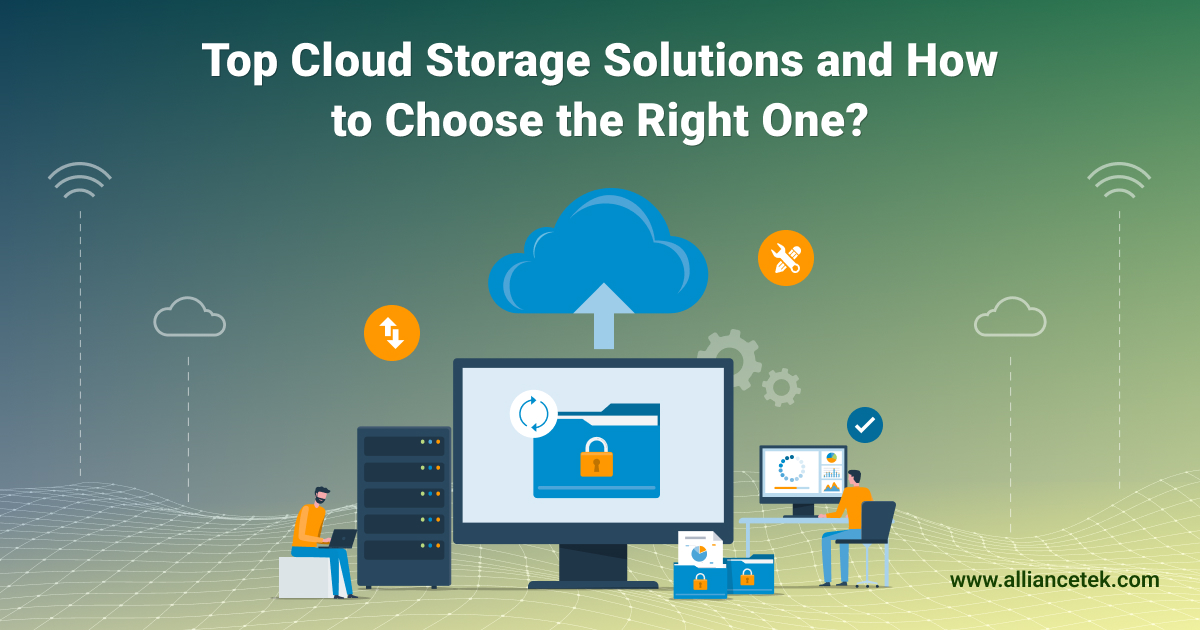Cloud storage has become more than a convenient backup tool; it is now a pillar of present-day life and business. You could be a freelance photographer who requires terabytes of space to store your data safely and securely, a small business team that needs to exchange data among a group of remote employees, or even an ordinary person who wants to have their files safe and available on devices; the choice of the service may be overwhelming.
Here is a closer look at the top providers of today and a practical guide on how to choose the best one that suits your needs. For startups building digital platforms, collaborating with a team skilled in PHP web development can help ensure seamless integration with chosen cloud services.
Table of Contents
Why Cloud Storage Matters?
Cloud storage is essentially the ability to store digital files, documents, videos, photos, and databases on third-party managed servers. Those files can then be accessed anywhere, provided one is connected to the internet.
Key benefits include:
- Accessibility: Work across phones, tablets, and computers.
- Scale: Add storage without purchasing new equipment.
- Teamwork: Access files and folders in real time, and permissions are controlled in a fine-tuned manner.
- Security: Enterprise-level encryption and data redundancy will help safeguard against loss or hardware breakdown. Businesses that require custom dashboards or advanced file management often benefit from specialized PHP application development to tailor their storage solutions.
As an increasing amount of our personal and professional lives is transferred to the internet, the selection of a trusted solution is no longer a choice.
Leading Cloud Storage Solutions in 2025
Below are some of the top services available today, each with unique strengths.
1. Google Drive
Best: Google Workspace (Docs, Sheets, Gmail) users (individuals and teams).
Strengths: Strong integration with the Google productivity suite, powerful collaboration features, and a free tier (15GB).
Considerations: The minimum price of the paid plans is 100 GB and can be extended to several terabytes. Google has data policies, which should be reviewed by privacy-conscious users. In such setups, rigorous PHP application testing is essential to keep custom scripts secure and reliable.
2. Dropbox
Best: Professionals who value file synchronization and sharing.
Strengths: Rapid and dependable syncing, Smart Sync to conserve local disk space, and great third-party integration.
Considerations: The Free plan has only 2 GB; paid options are more expensive but include such features as file recovery and version history. Teams frequently request PHP application integration to link Dropbox with CRM or analytics tools.
3. Microsoft OneDrive
Targeted users: This is aimed at users who are integrated into Microsoft 365.
Advantages: Full compatibility with Office software (Word, Excel, PowerPoint), real-time collaboration, and strong cloud security.
Considerations: 5 GB free; great value in combination with Microsoft 365 subscription plans. Businesses scaling on OneDrive often consult a professional PHP consultant to architect complex file-sharing portals.
4. Apple iCloud Drive
Best for: Apple device owners who desire to effortlessly synchronize the iPhone, iPad and Mac.
Strengths: Close connection with iOS and macOS, convenient photo and backup management, and family sharing.
Considerations: Windows support is available, but not as polished; the free tier is 5 GB. Large creative agencies sometimes partner with a full-service PHP application development company to connect iCloud data with their own apps.
5. Amazon Drive / Amazon Photos
Better for: Amazon Prime members and photographers.
Strengths: Prime subscribers have unlimited full-resolution photo storage and have easy backup choices.
Considerations: The document support is less than that of competitors. Some firms also invest in PHP software development to build custom media-management features on top of Amazon’s ecosystem.
6. Box
Better for: Companies that need high-level cooperation and adherence.
Strengths: Workflow automation and enterprise-grade security, as well as integrations with such tools as Slack and Salesforce.
Considerations: Free personal plan comes with 10 GB; the majority of the features are business-oriented. Global organizations sometimes hire dedicated PHP Web development team experts to create secure, large-scale integrations with Box.
7. pCloud
Best features: Customers who want to buy a product once and enjoy high privacy.
Strengths: lifetime storage, which is paid once, an optional client-side encryption folder (pCloud Crypto), and media streaming.
Factors: Lifetime plans are more expensive. Projects that require advanced content management can leverage Open Source customization to adapt pCloud APIs for unique workflows.
8. Sync.com
Best in: Individuals who care about privacy and small teams.
Advantages: Zero-knowledge encryption, high adherence to privacy regulations, simple pricing.
These are among the most popular services, but niche providers exist for specialized needs like large-scale video production, software development, or legal compliance.
Whether you are a solo creator or a growing enterprise, you might eventually decide to hire dedicated PHP developers to build integrations or automate workflows across these platforms.
How to Decide: A Step-by-Step Approach
1. Assess Your Needs
Begin by sorting your data: work documents, personal photos, large multimedia files, backups. Storage size and frequency of access estimate.
2. Prioritize What Matters
Is privacy non-negotiable? Do you work on a daily basis with a team? Prioritize these requirements in order to reduce the field.
3. Test Drive Free Tiers
The vast majority of the services have a trial or a free plan. Test them using the features of the user interface, speed, and compatibility.
4. Consider a Hybrid Strategy
One provider may be personal, and another one may work. As an example, iCloud for family photos and Dropbox for client projects.
5. Plan for the Future
Select a service that is scalable. Later upgrading of storage or transfer of a high volume of data can be time-consuming.
Final Thoughts
The cloud storage market of 2025 is rich in great solutions, and each of them has its own benefits. Google Drive and OneDrive are superior to those that are integrated with the corresponding productivity platforms. The Dropbox will continue to serve as a gold standard in terms of smooth synchronization. The former Sync.com or pCloud can be a more attractive option to privacy enthusiasts, whereas iCloud is the obvious option to Apple loyalists.
Finally, the correct cloud storage application balances your storage needs, finances, security needs and workflow. With a keen consideration of these factors and a trial and error on some of the services, you will be guaranteed that your files are secure, accessible and easily manageable, no matter where life takes you. Get in touch with experts at AllianceTek to learn more.











